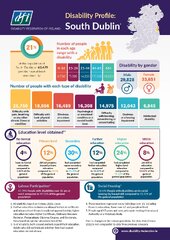Disability Profile - South Dublin
Issued on October 22 2024
Disability Profile[1]: South Dublin
21% of the population, or 63,479 people, have at least one disability
29,828 males, and 33,651 females have at least one disability
6,726 people 0-14 years old have a disability
7,095 people 15-24 years old have a disability
14,330 people 25-44 years old have a disability
17,106 people 44-65 years old have a disability
18,222 people over 65 have a disability
Type of Disability
25,750 people have difficulty with pain, breathing or any other chronic illness or condition
18,956 people have difficulty with basic physical activities
16,308 people have a psychological or emotional condition or a mental health issue
16,489 people have blindness or a vision impairment
12,043 people have Deafness or a hearing impairment
14,975 people have difficulty with learning, remembering or concentrating
6,845 people have an intellectual disability
Education Level Obtained[2][3]
4% of people with disabilities had no formal education, compared to 1.84% of the general population
12% of people with disabilities had only a primary school education, compared to 6.07% of the general population
30% of people with disabilities had only a secondary school education, compared to 25.75% of the general population
12% of people with disabilities had completed further education, compared to 10.69% of the general population
24% of people with disabilities had completed higher education, compared to 31.12% of the general population
8% of people with disabilities were still in education, compared to 10.89% of the general population
47.79% of people with disabilities over 15 are in employment[4], compared to 49.13% of the general population
18.13% of people with disabilities are in social housing[5] (by household) compared to 13.21% of the general population
Due to changes in the census questions, the data from Census 2022 is not comparable to data from previous censuses
[1] All statistics based on Census 2022, cso.ie
[2] Further education includes vocational/technical certificate and advanced certificate/completed apprenticeship, higher education includes Higher Certificate, Ordinary/Honours Bachelor, Postgraduate Diploma/Degree, and Doctorate. Data based on special tabulation from CSO.
[3] % of all adults, both ceased and not ceased their education. Adults who did not indicate whether they had ceased education are not shown.
[4] These numbers represent every individual over 15, including those in education, those over 65 and people retired.
[5] People aged 15 years and over, who were renting from a Local Authority or a Voluntary Body.

